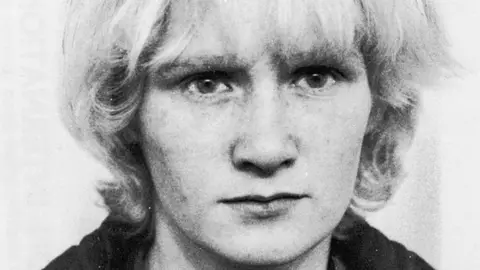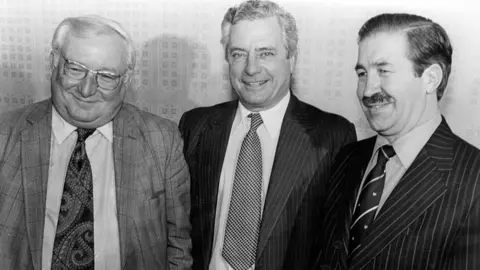Yorkshire Ripper death: Force apology over victim descriptions
 Getty Images
Getty ImagesA police force has apologised for the "language, tone and terminology" used in the 1970s to describe some of the Yorkshire Ripper's victims.
Senior West Yorkshire officers said some of the 13 women killed by Peter Sutcliffe, who has died aged 74, were "innocent" but implied others were not.
The son of his first victim Wilma McCann had appealed for an apology.
Force Chief Constable John Robins said the language used at the time was "as wrong then as it is now".
Speaking earlier, Richard McCann, who was five when his mother was killed, said: "They described some of the women as 'innocent', inferring that some were not innocent - including my mum.
"She was a family woman who, through no fault of her own, was going through adversity and made some bad decisions, some risky decisions."
"She paid for those decisions with her life."
 PA Media
PA MediaMr Robins said: "On behalf of West Yorkshire Police, I apologise for the additional distress and anxiety caused to all relatives by the language, tone and terminology used by senior officers at the time in relation to Peter Sutcliffe's victims.
"Such language and attitudes may have reflected wider societal attitudes of the day, but it was as wrong then as it is now."
He added that the force's approach to investigations was now "wholly victim-focused".
After the force published its apology, Mr McCann tweeted: "Now that's worth celebrating. Thank You."
Allow X content?
Detectives, journalists and the attorney general who prosecuted Sutcliffe have been criticised for dismissing some women who died as sex workers.
Senior officers' focus on the killer targeting only sex workers was seen as one of the many crucial wrong turns taken during the 1970s investigation.
At Sutcliffe's trial, prosecutor Sir Michael Havers, then attorney general, said: "Some were prostitutes but perhaps the saddest part of the case is that some were not. The last six attacks were on totally respectable women."


The Sutcliffe case was a humiliation for West Yorkshire police, revealing deep operational and cultural problems within the force and wider policing.
Reviews focused on the inquiry's shortcomings in a bungled investigation that never got on top of processing the information it received.
The consequence was sweeping reform to the way major crime investigations were conducted.
But the investigation was also compromised by the misogyny and racism of 1970s police culture.
In 1979, one senior detective told reporters the killer "has made it clear he hates prostitutes, many people do, but the Ripper is now killing innocent girls."
Police categorised Sutcliffe's victims as "innocent" and "non-innocent" based on class and lifestyle.
Marcella Claxton, a black woman who survived an attack by Sutcliffe in 1976 was racially abused, wrongly labelled a prostitute and her accurate description of the killer was dismissed.
The police service is now more diverse but some question whether the Chief Constable of West Yorkshire is right to say attitudes associated with the Ripper investigation are, "thankfully, consigned to history".
The victims' commissioner Vera Baird points to today's low number of rape prosecutions, suggesting the blaming of victims, particularly when they are women, still continues.

 Getty Images
Getty ImagesDame Louise Casey, the UK's first Victims' Commissioner said she was "pleased" to hear the force had apologised adding: "God forbid we ever go back to those days".
Ruth Bundey, a civil rights layer who later went on to represent some of the Ripper's victims, said: "It's been a long time coming. I'm glad it's come at last but of course there were some dreadful things said, even at Sutcliffe's trial."
'Rot in hell'
However, former West Yorkshire Police officer Elaine Benson, who worked on the Sutcliffe murders, told BBC Radio 4's PM programme she had not witnessed victims being treated differently.
"I was in the police service for 30 years and things became more politically correct and they were not at that time," she said.
"But I did not see from my position that any investigation was any the less for what a person's occupation was or for what they did.
"I never saw anything of that at all. They were murder victims and each murder was investigated as thoroughly as they could investigate it."
Current serving police officers said Sutcliffe was a "monster" who should "rot in hell" after hearing he had died.
Brian Booth, chairman of West Yorkshire Police Federation, said: "'On hearing of the death of Peter Sutcliffe today, I feel good riddance.
"He is the very reason most people step to the plate and become police officers - to protect our communities from people like him."
John Apter, chairman of the Police Federation, urged people to remember the victims and not Sutcliffe.
He tweeted: "The 13 women he murdered and the 7 who survived his brutal attacks are in my thoughts."
Boris Johnson's official spokesman said the PM's thoughts were with those who died, their families and friends and with those who survived.
He said: "Peter Sutcliffe was a depraved and evil individual whose crimes caused unimaginable suffering and appalled this country, nothing will ever detract from the harm that he caused, but it is right that he died behind bars for his barbaric murders and for his attempted murders."
